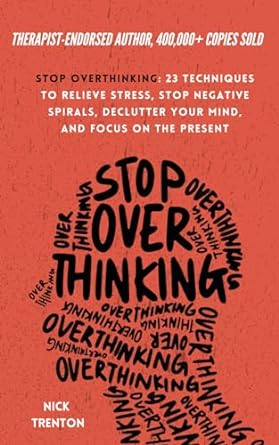In today’s fast-paced world, many people need help with overthinking. Whether replaying past events, worrying about the future, or getting stuck in a cycle of negative thoughts, overthinking can drain your energy, increase stress, and affect your overall well-being. If you’re tired of feeling mentally cluttered and anxious, Stop Overthinking: 23 Techniques to Relieve Stress, Stop Negative Spirals, Declutter Your Mind is a powerful resource that can help you regain control of your thoughts and find peace.
This book offers 23 actionable strategies designed to break the cycle of overthinking, manage stress, and clear your mind, relieving the constant noise in your head.
Why Overthinking Happens
Overthinking is a common mental habit that affects many people, especially in a world filled with information overload, social media comparisons, and high expectations. The problem arises when your mind becomes stuck in repetitive thought patterns, often about things you can’t control. Whether it’s overanalyzing conversations, worrying about making the right decisions or fixating on worst-case scenarios, overthinking creates mental clutter that can lead to stress and anxiety.
Fortunately, Stop Overthinking addresses these issues head-on, offering simple, practical solutions to help you break free from these thought loops.
What You’ll Learn From the Book
Stop Overthinking provides readers with practical tools and techniques that can be applied to everyday life. The book’s 23 strategies are easy to understand, accessible to all, and tailored to help you take control of your mental landscape. Some of the key concepts covered include:
- Mindfulness Techniques: The book offers several mindfulness exercises that help you become more aware of your thoughts without letting them spiral out of control. These practices allow you to stay grounded in the present moment and avoid dwelling on negative thoughts.
- Cognitive Restructuring: By changing how you interpret situations, this technique helps you shift your perspective on events and emotions, allowing you to break free from overthinking patterns.
- Stress-Relief Tools: You’ll discover relaxation exercises and self-care practices that reduce mental and physical stress, allowing your mind to calm and declutter.
- Thought-Stopping Techniques: These strategies teach you how to interrupt negative thought cycles as soon as they begin so you don’t end up going down a rabbit hole of overthinking.
- Journaling Practices: Writing down your thoughts can help you process your emotions and gain clarity. The book outlines ways to use journaling effectively to declutter your mind and relieve stress.

How These Techniques Can Help You
Whether you’re dealing with personal challenges, work-related stress, or general anxiety, the techniques in Stop Overthinking can help you:
- Gain Control Over Your Thoughts: Instead of letting your mind run wild with worries, you’ll learn how to manage your thoughts, giving you greater mental peace and stability.
- Reduce Stress and Anxiety: Many overthinkers experience high-stress levels, but this book equips you with stress-relief techniques that ease tension and calm your nervous system.
- Boost Productivity: Overthinking can leave you feeling paralyzed, making it difficult to make decisions or complete tasks. This book helps clear mental fog, enabling you to focus and make better choices.
- Improve Emotional Well-Being: Stopping negative spirals and reducing self-doubt will make you feel more confident and emotionally balanced.
Who Should Read Stop Overthinking?
This book is ideal for anyone who feels trapped by their thoughts and is looking for practical ways to manage overthinking. It’s beneficial for:
- Chronic overthinkers who struggle with replaying scenarios or second-guessing their decisions.
- People dealing with stress from work, relationships, or personal challenges want to find ways to manage their mental load.
- Individuals seeking mental clarity and peace hope to create more space for positivity and focus.
- Anyone who wants to improve their emotional and mental well-being by learning techniques to manage their thought patterns more effectively.
The book’s techniques are simple enough to be used by anyone, regardless of their background or experience with self-help practices.
How to Get the Most Out of the Book
To truly benefit from Stop Overthinking, it’s essential to:
- Take your time: Don’t rush through the techniques. Instead, experiment with one or two strategies at a time and allow them to work.
- Stay consistent: Like any habit, overcoming overthinking takes practice. Implement these techniques consistently, and you’ll start to notice improvements in your mental clarity and overall well-being.
- Be patient with yourself: Changing thought patterns doesn’t happen overnight. Be gentle with yourself and recognize that it’s a gradual process.
Final Thoughts
If overthinking affects your quality of life, it’s time to take action. Stop Overthinking: 23 Techniques to Relieve Stress, Stop Negative Spirals, Declutter Your Mind offers simple, practical tools to help you break free from the mental clutter that holds you back. Whether you’re dealing with stress, anxiety, or the overwhelming nature of daily life, this book can provide relief, bringing clarity and calm to your mind.
Investing in your mental health is one of your best decisions. If you’re ready to reclaim your peace of mind, Stop Overthinking is the guide you’ve been searching for.